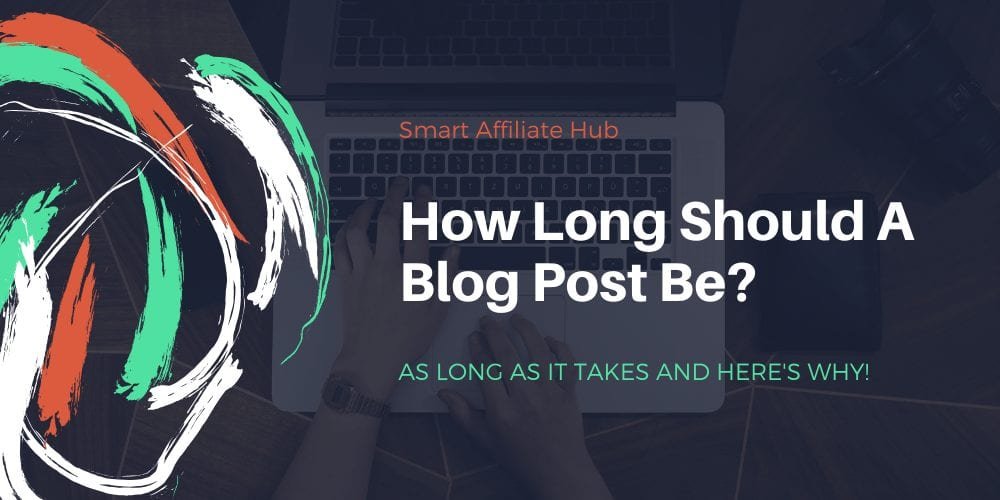
Since I started blogging back in 2017, I’ve always wondered. How long should a blog post be? At the time, the standard blogging length was 500 words, but that’s no longer the case.
Over the years, Google has heavily emphasized in-depth content. Why? It’s because longer articles generally have more details.
With that being said, every blog post is different. Some may require as little as 500 words, while others may require thousands of words to get the point across.
So over the years, I’ve learned to stay away from the idea of the standard blog length. Instead, I focused on writing what is necessary to complete my articles.
In this article, I am going to provide you with more insight on what I believe should be the length of your blog posts. Without further ado, let’s get started!
My Blogging Standards
There are no set guidelines when it comes to blogging. Let’s say I’m writing an article on how fast can a cheetah run. I wouldn’t need to produce a blog post with over 1000 words.
In fact, I wouldn’t even focus on the number of words, but instead, focus on answering the question.
This will make my article easier to digest and it makes my readers happy because they could find the answer to their question very easily.
After answering the questions, I might even include how the cheetah is able to run so fast and what the pros and cons are for such feats.
The point is, write what is necessary. Not only because you want your blog posts to be lengthy.
Use Other Successful Bloggers As An Example
If you do your research, you will notice many blog posts that are ranked on the first page usually contains long articles with some being over 1000 words.
It makes sense because those with longer articles would usually provide more information to their visitors.
Every niche is different, so you’ll find various blog post lengths as you check out your competition. Keep in mind sometimes pictures are more important than words.
Some Can Still Succeed With Less Than 1000 Word Articles
There are exceptions for some websites with articles containing fewer than 1000 words and still rank relatively high. This can happen due to a couple of factors:
Targeting low-competition Keywords – Even if an article contains very few words, they can still rank high because the author utilized keywords that are not very competitive (long-tail keywords).
This is very effective, but if your content is not long enough to provide adequate information to your visitors, they wouldn’t stick around very long.
There are tools that you can use for keyword research! I personally use Jaaxy Keyword Research Tool. You can find my article reviewing this product by Clicking Here.
The Author Engages With His Or Her Visitors – Having articles with over 1000 words doesn’t mean much if your visitors are not sharing or leaving comments.
If there are no engagements on your website. It can also affect your bounce rate. The bounce rate is the percentage of visitors who come to your website and leaves. People who read your articles are likely going to read your visitor comments as well.
Also, did you know that comments are counted toward the overall word count on your page? Search engines like Google will notice the engagement in your article and rank it higher than those that have over 1000 words, but minimal to zero engagements.
The Website Has Authority With Search Engines – Authority is not something given right away. It takes time to accomplish and the longer you have your domain and website, the more authority you can potentially have. If your website has authority, it will greatly increase the time for Google to find, crawl, and index your articles.
You can read more about establishing an authority blog by Clicking Here.
Writing Over 1000 Words Can Have A Negative Effect
Most people have a low attention span when it comes to reading online, so if you are not a good writer, this can really hurt you.

Would you continue reading after finding out how poorly written an article is? Probably not.
To tell you the truth, I am not a good writer myself, but I talk a lot and blogging is a way for me to talk through text.
The problem with long and poorly written articles is that the chance of someone sharing your article is highly unlikely.
This means you not only wasted your time typing, but you will also miss out on a lot of potential referrals to your website. In the end, your website will not rank very well in search engines.
If you need to write a long article to get the point across, make sure you proof-read your article multiple times and structure it so it is easy to read.
My Personal Tips

Tip #1 – Instead of having chunks of paragraphs, you can break it up by having two or three sentences. It makes it easier to read and encourages those who hate reading to finish your article.
Tip #2 – Try not to focus too much on the word count when writing your articles. You can double-check after you are done.
When I write my article, I don’t focus on the word count. I try to focus on why I am writing the article and if I am providing the right information.
Tip #3 – Quality over quantity! Sometimes it is better to deliver quality content over quantity of words. Most visitors will really appreciate it when you just get straight to the point.
You can use me as a BAD example because I tend to get off track and type about random stuff before I get to the point.
Tip #4 – When writing your articles, try to ask questions. For example: Let’s say I am writing about how to help your children stay on track until they are 18 years old.
You’ll want to ask questions like: How old are your children right now and what have you done so far to keep them on track? What kind of educational plan have you set up for your children?
These questions will encourage engagements with your visitors because some people will answer your question. You just need to initiate the conversation.
Tip #5 – Picture speaks a thousand words! Most people hate reading and I’m one of those people. It’s best if you can include illustrations of what you are talking about such as data charts, etc. This will make reading your article fun and educational.
Thank You Again For Reading
Hopefully, this article was helpful and provided you with an idea of how many words should be in a blog post. If you are new to affiliate marketing or blogging in general. I highly recommend checking out my other articles such as:
- How To Rank Higher On Google
- How To Find Your Niche Idea
- How To Increase Blog Traffic
- How To Get Targeted Traffic
- How I Got Google AdSense Approved In 14 Days
- Must Read Before You Start Affiliate Marketing
- How To Set Up Your Website For Free
- Affiliate Marketing 101
If you are new to blogging, I highly recommend that you check out Wealthy Affiliate. They offer a free membership plan for those who would like to learn about the basics of blogging and making money online.
If you have additional questions, please leave a comment down below and I will try my best to help you out.



 Protected by Patchstack
Protected by Patchstack